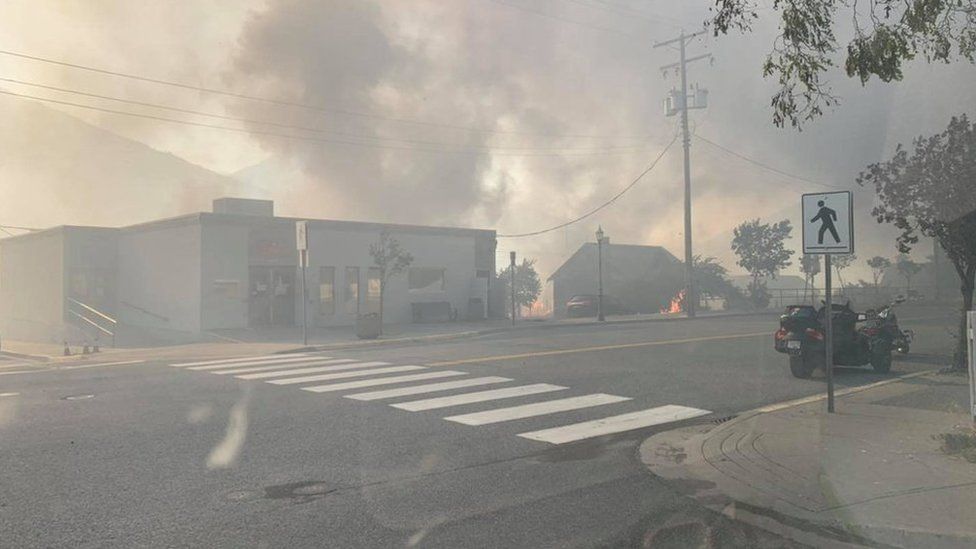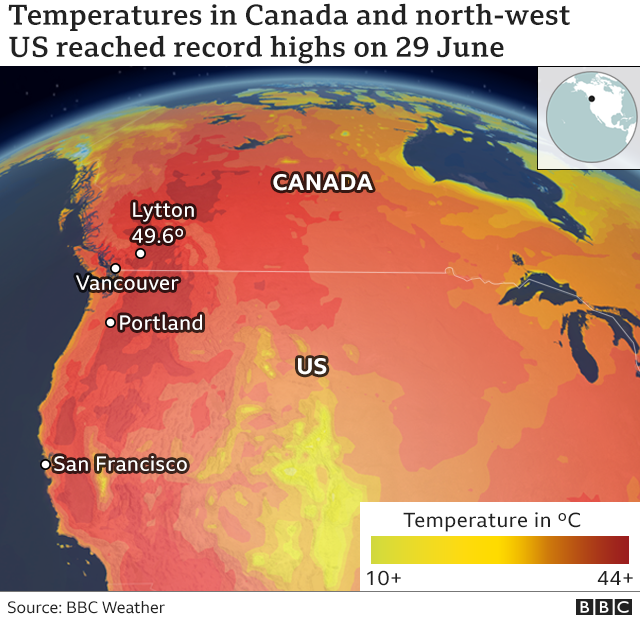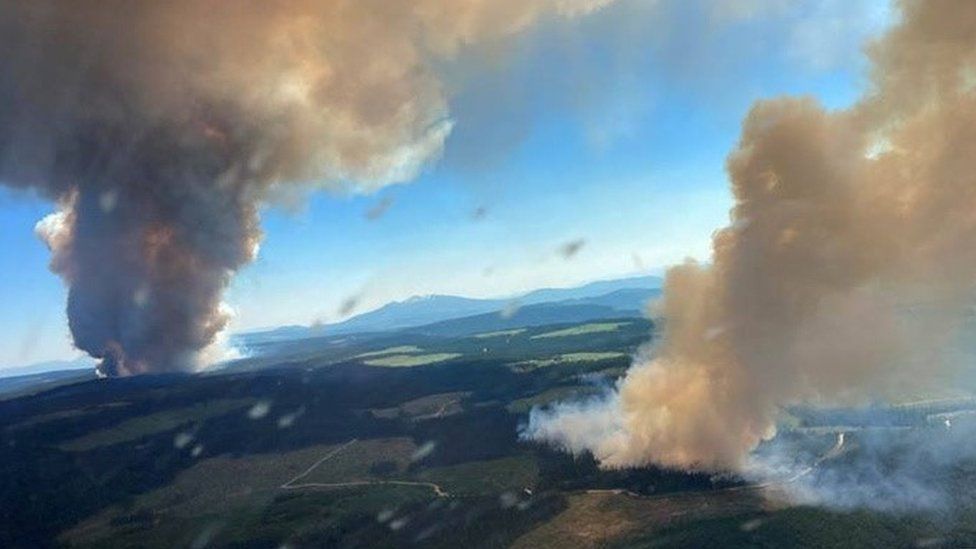begin quote from:
Canada Lytton: Heatwave record village overwhelmingly burned in wildfire
- Published
A wildfire has burned 90% of the village that recorded Canada's highest ever temperature, the local MP says.
Brad Vis said the fire had caused extensive damage to Lytton, in British Columbia, and to surrounding critical infrastructure.
Jan Polderman, mayor of Lytton, told the BBC he had been "lucky to get out with my own life".
"There won't be very much left of Lytton," he said. "There was fire everywhere."
Experts say that climate change is expected to increase the frequency of extreme weather events, such as heatwaves. However, linking any single event to global warming is complicated.
Lytton this week recorded the country's highest ever temperature of 49.6C (121.3F).
And abnormally high temperatures have been recorded in swathes of North America.
British Columbia, in western Canada, recorded 486 deaths over five days compared with an average of 165 in normal times.
Chief Coroner Lisa Lapointe blamed the extreme weather. The western province had seen only three heat-related deaths over the past three to five years.
Many of those who died, Ms Lapointe said, had been living alone in unventilated homes.
Temperatures have been easing in coastal areas of Canada but there is not much respite for inland regions. The weather system is now moving eastwards over the Prairie provinces - Alberta and Saskatchewan and parts of Manitoba have been placed under Environment Canada heat warnings.
What happened in Lytton?
Residents fled on Wednesday, many without their belongings, as smoke and flame engulfed the village, which is home to about 250 people and located about 260km (162 miles) north-east of Vancouver.
"Within about 15 minutes the whole town was engulfed in flame," Mayor Polderman told the BBC.
"People basically just grabbed their pets, grabbed their keys and got into their car and fled."

Winds of up to 71km/h (44 mph) were pushing the fire north into the community on Wednesday evening, CBC meteorologist Johanna Wagstaffe reported. Hot, dry and windy conditions in the area could mean the fire was moving at 10 or even 20km/h.
 IMAGE COPYRIGHT2 RIVERS REMIX SOCIETY
IMAGE COPYRIGHT2 RIVERS REMIX SOCIETYIn a social media post on Thursday, MP Brad Vis said he would not be attending Canada Day activities because he was devoting all his time to the emergency situation.
"There are reports of several injuries. The situation is ongoing," he wrote.
Residents were being directed to nearby communities where reception centres were being set up, while the British Columbia Wildfire Service was diverting crews and equipment from other areas to respond to the fire.
Jean McKay, who left the First Nations community of Kanaka Bar, about 15km from Lytton, with her 22-year-old daughter Deirdre, told CBC how hard emotionally it had been to leave their home.


"I cried. My daughter cried. She said, 'I don't even know why I grabbed my key. We might not even have a home.' I said, 'Yeah I know. As long as we're together we'll survive.' I just pray that our houses are OK."
"You can't even comprehend it," Lytton evacuee Edith Loring-Kuhanga told CBC Radio. "Our entire town is gone."
Before the fire, Lytton had recorded the highest temperature ever seen in Canada on three consecutive days.
How dangerous was the heat elsewhere?
In Vancouver, British Columbia's biggest city, heat is believed to have been a contributing factor in the deaths of 65 people since Friday.
The city has opened 25 air-conditioned cooling centres where people have been resting or working from their laptops.
"I have no air conditioning, only a fan at home - I came here just to work where it's cool," one woman, who gave her name only as Lou, told AFP news agency.
 IMAGE COPYRIGHTREUTERS
IMAGE COPYRIGHTREUTERSIn the US state of Oregon, health officials tied more than 60 deaths to the extreme heat while in Washington state, 20 deaths were attributed to the weather, the Associated Press reports.
Seattle, Portland and other cities broke all-time heat records, which climbed above 46C in places.
Both Canadian Prime Minister Justin Trudeau and US President Joe Biden warned of the threat of wildfires, with Mr Biden telling governors of western US states it was as "severe as it's ever been".

Can the heat be linked to climate change?

I've heard from scientists who say that in just a few days they'll be able to determine just how much human driven warming has contributed to the searing temperatures seen in British Columbia.
One interesting piece of evidence is the lack of respite that night brings - recent temperatures at midnight in BC have been 2C warmer than the normal summer daytime figure.
Researchers say this combination of day and night-time heat is very dangerous for humans - a study published last year indicated that these compound events are closely linked to emissions of greenhouse gases.
Natural variability and local factors such as sea breezes can raise or limit the impacts of extreme heat. But the bigger picture is the rising thermometer of global heating is impacting all events.
"Every heatwave occurring today is made more likely and more intense by human-induced climate change," Dr Friederike Otto from the University of Oxford told the BBC.
"Climate change is definitely one of the drivers of the intensity of this Canadian heatwave - but it is not the only one and determining how much it impacts it, is a work in progress."
Even if they can't directly attribute this heatwave to climate change, experts say the fingerprints of global heating are all over it.
No comments:
Post a Comment